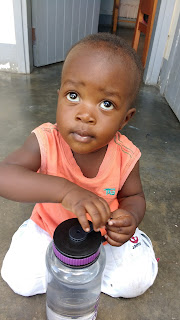“Banyeta Akiiki!” It is such a common phrase for me.
Especially with small children who don’t yet understand the rudeness of “Omujungu!”,
I take the time to explain, “Banyeta Akiiki. Tibanyeta omujungu. Banyeta oha?” “They call me Akiiki. They don’t call me
white (foreigner). Who do they call me?”
Fort Portal is part of the Batooro kingdom. The Banyoro and
Batooro are related kingdoms, hence the, linguistically speaking one, language
Runyoro-Rutooro. Here in beautiful Midwestern Uganda (I moved from the Midwest
of the US to the Midwest of UG, like a cool kid.), your empaako may be more
important than your name. It is a sign of respect. There are many people I know
at the market only by their empaako. Children call their parents by their empaako
instead of by “Maama” or “Taata.” It is 100% polite to respond to “Oraire ota?”
or “Osiibire ota?”, “How have you spent the
night?” or “How have you spent the day?” with “Empaako?” It’s simply rude
to answer someone, and then greet them back, without knowing their empaako.
What is an empaako? I’m glad you asked. First of all, the
word “empaako” is both singular and plural, determined by context. Empaako are
a very, very important part of Banyoro-Batooro culture, and they are not found
in other parts of Uganda, although similar practices, such as clan names, are.
Simply translated, empaako are “pet names.” Each one has a meaning behind it,
though the meanings can be many, or they can be disputed by the
Banyoro-Batooro. My empaako, Akiiki, is a very common empaako, and it means “all
welcoming.” Other common empaako include Abwooli, “beautiful, cat,” Ateenyi, “snake
spirit,” or Apuuli, “lightning/thunder spirit.” Some empaako are restricted to
men, like Apuuli, although men can have any empaako except that of the king, Okaali.
As discussed above, greeting someone “Empaako?” is a very
common practice. If you forget to ask someone’s empaako, like a certain
American living currently living in Uganda frequently does, your greetings are
often repeated. I cannot tell you the number of times I have had the conversation
demonstrated below.
“Oliyota?”
“Kurungi. Oliyoto?”
“Kurungi. Empaako yawe?”
“Empaako yange Akiiki. Kandi iwe?”
“Amooti. Oliyota Akiiki?”
“Kurungi Amooti. Oliyota Amooti?”
“Kurungi Akiiki.”
“How are you? (Informal greeting)
“Good. How are you?”
“Good. Your empaako?”
“Mine is Akiiki. And you?”
“Amooti. How are you Akiiki?”
“Good Amooti. How are you Amooti?”
“Good Akiiki.”
For expats living in the Banyoro-Batooro kingdoms, it is a
sign we have been here for a while. It is also a sign that we have been
accepted by at least one munyoro or mutooro. Like name signs in American Sign
Language, only a munyoro or mutooro can give you an empaako. I cannot give
another expat an empaako. There are other customs surrounding empaako being
given to a munyoro or mutooro, which I encourage you to research. Regardless of
whether you are born a munyoro, mutooro, or other nationality, you are supposed
to have a party thrown for you by the one who gives you your empaako. For me,
it never happened, because I was given my empaako by shop owner in Kyenjojo. His
empaako is Adyeri.
For me, my empaako is my identity in Uganda. Even though it
has never been made “official,” and some Ugandans tell me I have to have my
party before they will call me Akiiki, my name does not matter so much around
here. When I go to the market, I introduce myself as Akiiki. I learn the
empaako of those who I buy from frequently. Amooti is my favorite. She speaks
Rutooro slow enough that I can understand her most of the time. When people
call me “omujungu,” it is my first defense. People are much more open to
calling me “Akiiki” than hearing they are wrong for calling me what I honestly
am. It even works for harassment. When I get called lewd names, I simply tell
them, “Banyeta Akiiki. Empaako yawe?” It opens the door for me to begin a
relationship, or at least an acquaintanceship, with these people. Yes, they
will scream “Akiiki!” at me every time I pass, but at least they are respecting
me. (Remember that using someone’s empaako is a sign of respect.) The only
problem for me is remembering everyone’s empaako. For example, I have explained
to the children in my compound that I do not want to be called “omujungu.” Now
the children in my compound have begun to greet me “Ta Akiiki!”, “How are you, Akiiki?!”, and the only
response I have is “Muli muta?”, “How are
you (all)”? because I have yet to learn each one’s empaako.
For more information about empaako, other naming practices,
or the Banyoro and Batooro kingdoms, please visit their websites!




































